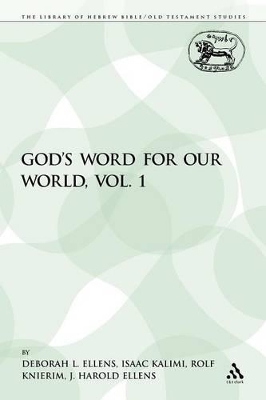The Library of Hebrew Bible/Old Testament Studies
3 total works
Shape and Message of Book III (Psalms 73-89)
by Deborah L Ellens, Rolf Knierim, Dr J Harold Ellens, and Robert L Cole
Published 1 January 2000
This study of Book III of the Psalter examines evidence for the canonical organization of these seventeen psalms and finds cohesive links that create a consistent and coherent dialogue throughout. Continual laments by a righteous individual on behalf of and in concert with the nation spring from the non-fulfilment of hopes raised in Psalm 72 at the end of Book II. Divine answers give reasons for the continuing desolation but assure the eventual establishment of a kingdom without specifying its time. Book III ends as it began, asking how long God's wrath will smoulder, and in response Book IV opens with Psalm 90 contrasting human and divine perspectives on time.
God's Word for Our World, Vol. 1
by Deborah L Ellens, Isaac Kalimi, and Rolf Knierim
Published 1 January 2004
This two-volume work in biblical studies is a commemorative presentation to Simon John DeVries, noted Old Testament Scholar.
Volume one offers a series of essays on issues in Hebrew bible studies. The topics addressed include the nature of Yahweh as God of Israel, a reexamination of the Exodus tradition, the Priestly code and practices, prophets and revelation, biblical poetry, issues in biblical linguistics, dramatic narrative in Hebrew Bible tradition and Yahweh's deliverance as redemption in Israel.
Volume one offers a series of essays on issues in Hebrew bible studies. The topics addressed include the nature of Yahweh as God of Israel, a reexamination of the Exodus tradition, the Priestly code and practices, prophets and revelation, biblical poetry, issues in biblical linguistics, dramatic narrative in Hebrew Bible tradition and Yahweh's deliverance as redemption in Israel.
v. 458
The writers of the biblical laws, like the writers of other legal corpora throughout history, considered the regulation of sex to be of some importance. A study and comparison of the two groups of sex laws in the Bible, those in Leviticus and Deuteronomy, reveal that factors even more narrowly focused than the general desire to control social behavior shape the texts. These factors, as reflected in the text, are responsible for the differing conceptual matrices within Leviticus and Deuteronomy. Whereas the interest of the Leviticus sex texts is ontology, that is, the classification or oder of kinds and their relationships, the interest of the Deuteronomy sex texts is property, that is, the man's ownership of the woman's sexuality and its protection. Ellens shows how these differing interests influence subtle corresponding differences in the conceptualization of women in the two groups of texts.

